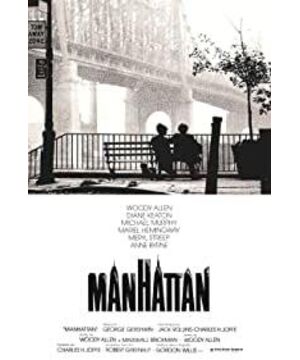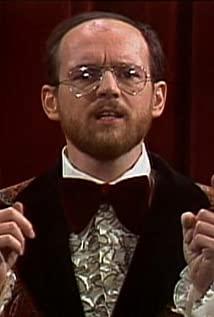When the camera pulls toward the city, from high-rise buildings to streets, from traffic to pedestrians, Woody Allen's voice sounds, and the story of the intellectual he is best at begins to be told in Manhattan, New York.
He borrowed Isaac's novels to describe his feelings about Manhattan. He mulled it over and over, from cory (old-fashioned) to proven (profound)/preachy (preaching), to angry (angry), and finally wrote Down "He is as gritty and romantic as the city he loves, and behind his black-rimmed glasses, coiled with a jungle cat-like sexuality. New York is his city, as always, it belongs to him." That's Woody Allen-esque expression, imagery, direct, uninhibited and narcissistic.
Isaac, who has started to go bald in middle age, has a small body but has a quick, fast-paced speech, and has a literary and humorous conversation. Willfully quit his job and planned to write his own novel. His work was not going well and his relationship was not going well. Ex-wife fell in love with the same sex left him and is writing a book to expose their private lives, Isaac is irritable and incompetent, while he and his 17-year-old girlfriend Tracy, who can't help himself. It was just a game of nature, and it happened that his friend Yell was eager to get rid of his lover Mary, so he pushed her to Isaac. Isaac and Mary didn't talk much from the beginning, but they were gradually attracted by loneliness, and they became lovers. So Isaac got rid of Tracy, who was going to study in England, but the good times didn't last long. Mary and Yell got back together again. Isaac, who was dumped, went back to Tracy who was going to leave. Tracy Asking him to wait six months and making him believe in love and people, Isaac squeezes a smile and the film ends.
The story is not surprising, but after reading it, it makes people feel a little sad and a little sad. Because the characters in the story, except for the seventeen-year-old Tracy, the rest are clear-cut middle-class intellectuals composed of screenwriters, professors, editors and other occupations. They are bright and beautiful on the outside, they look decent, confident, and talk well, but their hearts and spirits are extremely fragile, anxious, and confused. Like the question Isaac asked Yell at the beginning, "If the four of us were going home and we were crossing a bridge, and it was in the water, someone was about to drown. Some of us would have the guts to dive into the freezing water and rescue him. Is this the drowning person?" The answer is no one, they're all drowning people who can't take care of themselves, no one else.
"I think the important thing in life is courage," says Isaac, because they both lack the courage to face themselves. Isaac can output his views like a machine gun. What excites him more than tobacco and alcohol is the war of words. He is arrogant and cynical. Sometimes he uses absurd analogies to support more absurd arguments, and sometimes he directly points to the essence of things and problems. , when it rose up, it commented on various writers, directors and other artists, some of them were gods, and some were worthless.
It's just that behind this rhetorical wisdom is a disorienting emptiness. They're like intellectuals but only on paper, Isaac writes comedies for TV shows, Yell has a biography of O'Neal that never ends, and I don't remember Mary's work, oh yes, she fictionalize the movie. Gossip became the new pornography of the daily newspaper, as Yael said. But they also indulge their own emotions and desires, and their relationship is chaotic, but they don't want to break free. Talking about the truth of love is more profound than anyone else, but still love is superficial.
You think it is the so-called soul attraction of literary and artistic youth, but it is just a surrender to beauty and primitive carnal desire. You hardly see that Isaac and Mary have any in-depth discussion and exchange of literature, art, and spiritual values. He does not agree with Mary's point of view, but just likes her refined but decadent expression. Mary also admitted that "you have a little The tendency to go against me is something that appeals to me." Mary also complained to Yell, "Can your love for me be expressed only through sex? Why can't it have other meanings, such as care or spirituality? contact?" Mary felt that Isaac was more suitable for marriage and childbirth, and I think it was also because of Isaac's proud sexual ability. They did not pin themselves on alcohol and drugs, but for the so-called love, which is actually sexual desire, they flew into the flames.
They don't know how to love, not only because of their emptiness and numbness, but also because they don't dare to take responsibility, Yell doesn't want children at all, Mary can't even plan for four weeks, and Isaac is even more afraid of seventeen Tracy haunted herself. They are swaying in their relationship, like smoking marijuana called freshness. When the freshness wears off, they start to miss the aftertaste of the last cigarette, and it is not difficult to explain that they are always trying to save their old love. .
Woody Allen is extremely skilled at deconstructing and ironing intellectuals. Characters like Isaac can easily come up with a series of names such as Cezanne, Bergman, Nabokov, and they all have more or less genius. The disease is actually narcissism, and Alan also used Isaac's words to give them advice, "You should meet some stupid people occasionally, so that you can learn something." It's just that once you are complacent with your own logic and words , they are no longer interested in truth and correctness, but begin to make excuses for their selfishness, emptiness, poverty, vanity, deceit, and betrayal. They live for love, take escapism for granted, cynicism for talent, lust for love, and duty for shackles, all they can see and chase is the joy and passion in front of them. "People living in Manhattan, they're not bothering themselves, they're creating unnecessary, mind-blowing problems. That way, they don't have to deal with the bigger, life-and-death problems of the world." Really Woody Allen The perfect comment for this type of person.
Speaking of Isaac and 17-year-old Tracy, she is no longer ignorant, but also dares to love and hate. She is sad that "I can't believe that you meet someone who loves more than me", but she also has leave me alone. . She understands art but never shows off, loves Isaac but loves herself. When Isaac says "I just don't want you to change, you don't have those characteristics that I like about you", you should have a little confidence in people, gentle but straight to the heart of the problem, Isaac's selfishness, paranoia exposed After all, Tracy's self-love and self-respect also made her no longer an ignorant little girl who only knew to worship and obey Isaac. Isaac's smile was a little helpless, a little reluctant, a little ashamed, and a little gratified. I don't know if he will change in six months, or if he has not changed, he can be reminisced about this situation, but he was lost at that time?
Aside from the sad story, the film uses black and white tones, but the distance between the shots is just right, the perfect composition and the harmonious relationship between people and scenery make the picture more artistic. Whenever you are immersed in the feelings of the characters, the camera will always subtly zoom out to the New York City scene, whether it is under the bridge, on the boating lake, or in the exquisite art galleries and cafes, as Isaac said, Woody Allen has romanticized the city of New York beyond words. The empty mirrors of the New York panorama at the beginning and the end also seem to dilute her flamboyant charm, making the black and white New York appear heavier and more textured.
Hopefully Isaac can truly be as gritty and romantic as the city he loves.
ps: Diane Keaton is so beautiful in Anne Hall and Manhattan, you won't believe it, she must be crazy for saying she never felt beautiful! Although they are all slightly superficial literary girls, Diane Keaton's existence always makes the characters look more intellectual, more rebellious, and more youthful than they originally were.
View more about Manhattan reviews











